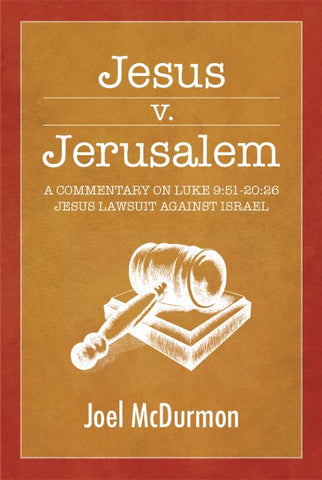The Holy War of Hospitality (Part One)
When is a dinner invitation more than a meal? When it’s a kingdom banquet.
In Luke 14:12–24, Jesus tells what modern Bibles refer to as “The Parable of the Great Banquet.” This familiar parable, which tells the tale of a man giving a great banquet is not simply a general story about morality. It is also not about who to invite to your dinner parties. This parable is about who will eat bread in the Kingdom of God (Luke 14:15b).
Many other parables precede the “Great Banquet” parable and help set the context for what and why Jesus is telling this particular parable to this particular group. While all of the parables, to some degree, teach about the Jews’ privileged status as God’s covenant people, they also warn about taking this for granted. Jesus’ statements at the end of Luke 13 are the most clear demonstration of this: when He tells the Pharisees that He must continue on to Jerusalem to suffer and die:
“I must go on my way today and tomorrow and the day following, for it cannot be that a prophet should perish away from Jerusalem. O Jerusalem, Jerusalem, the city that kills the prophets and stones those who are sent to it! How often would I have gathered your children together as a hen gathers her brood under her wings, and you were not willing! Behold your house is forsaken.” (Luke 13:33–35a)
As this warning is still ringing in their ears, Luke tells us that Jesus went to dine “at the house of a ruler of the Pharisees” for a Sabbath meal, and all the attendees “were watching him carefully” (Luke 14:1). This has a level of irony and humor to it that can’t be missed. Jesus tells them that they were unwilling to gather around Him, and yet here they are gathered around Him in a religious leader’s home. Of course they were on edge and watching Him closely.

Plowing through the often-difficult terrain of Soteriology, Eschatology, and Hermeneutics, David Chilton presents a simple and coherent vision for Gospel fruitfulness, Gospel effectiveness, and eventually, Gospel victory.
One thing that can be said about Jesus as a dinner guest is that He was never lacking in things to say. After asking a question about the Sabbath that none of the guests—which included both lawyers and Pharisees—would answer, Jesus notes how the guests chose the places of honor when it came time to begin the meal. He chides them for supposing that they deserved a higher position at the table, which could result in an embarrassing social faux pas.
“When you are invited by someone to a wedding feast, do not sit down in a place of honor, lest someone more distinguished than you be invited by him, and he who invited you both will come and say to you, ‘Give your place to this person,’ and then you will begin with shame to take the lowest place. But when you are invited, go and sit in the lowest place, so that when your host comes he may say to you, ‘Friend, move up higher.’ Then you will be honored in the presence of all who sit at table with you. For everyone who exalts himself will be humbled, and he who humbles himself will be exalted.” (14:8–11)
Jesus then turns and addresses His host about invitation etiquette. Recalling that this man was a “ruler of the Pharisees,” and the guests were already present, Jesus’ advice seems to be a bit late. But as Luke’s narrative of the evening unfolds, it becomes quite clear that Jesus is using His present situation to teach a deeper spiritual lesson.
He said also to the man who had invited him, “When you give a dinner or a banquet, do not invite your friends or your brothers or your relatives or rich neighbors, lest they also invite you in return and you be repaid. But when you give a feast, invite the poor, the crippled, the lame, the blind, and you will be blessed, because they cannot repay you. For you will be repaid at the resurrection of the just.” (14:12–14)
It is at this point that an unnamed dinner guest can contain himself no longer and decides to pipe up and add to the conversation with a spiritual-sounding “truth” of his own: “Blessed is everyone who will eat bread in the kingdom of God!” (13:15). While we are not told what this individual said or did prior to this interjection, it is not difficult to imagine him as either a fellow Pharisee or a rich neighbor of the host and one who might have even selected a higher place of honor at the table than he should. At any rate, he certainly thought of himself as one who would be present at the table eating bread in the kingdom of God. A snarky paraphrase of his religious outburst might go something like: “Blessed is everyone who gets to eat bread with God and me.”
On this boast in verse 15, Albert Barnes writes: “The kingdom of God here means the kingdom which the Messiah was to set up. The Jews supposed that he would be a temporal prince, and that his reign would be one of great magnificence and splendour. They supposed that the Jews then would be delivered from all their oppressions, and that, from being a degraded people, they would become the most distinguished and happy nation of the earth.” [1]
Assuming that eating bread in the kingdom of God was his birthright as a Jew, this guest gives Jesus the perfect opportunity to pinpoint His teaching with another parable. Albert Barnes continues:
Our Saviour having mentioned the resurrection of the just, [in verse 14] this man understood it in the common way of the Jews, and spoke of the peculiar happiness which they expected at that time. The Jews only, he expected, would partake of those blessings. Those notions the Saviour corrects in the parable which follows. [2]
The parable of the Great Banquet is familiar to most and often used as proof that the Gospel should be distributed freely and in great abundance to anyone and everyone. This is certainly true and a noble practice, but this is not what this parable is teaching in its original context. As we have briefly surveyed the other things Jesus said prior to speaking this parable, it should be clear that He was quite intentional in the lead-up to it. All three of these monologues (choosing places of honor, inviting those that can’t repay, and the Great Banquet parable) build on each other, much like the single parable in Luke 15 that our Bibles break into three. In reality, Luke 15 is one long lesson (see Luke 15:3: “So he told them this parable…) about finding—or re-discovering—that which was lost. Jesus gives three different examples that illustrate this one point. He tells of a lost sheep (vv. 4-7), a lost coin (vv. 8-10) and, finally, a lost son. The first two get the Pharisees’ and Scribes’ attention by dealing with strictly material things while the last one cuts to the root of their national and religious jealousy and arrogance as “God’s chosen people” (they are the “older brother” of the Prodigal Son, vv. 25-32). Jesus does something similar in Luke 14:7–24 with three related stories. [3]
In fact, as Joel McDurmon points out, Jesus’ many different parables have this as a common theme, i.e., calling attention to the hypocrisy and disobedience of the “chosen people”:
From the moment [Jesus] sets his face to go to Jerusalem [Luke 9:51], the lawsuit against unfaithful Judaism dominates His message and His journey. The proceeding chapters of Luke right up to the Olivet denunciation in chapter 21 contain no less than 27 separate denunciations and warnings. These were not general warnings against wickedness; they were pointed accusations specifically directed at Jerusalem and the unbelieving Jews… About half of these 27 instances are parables. [4]
If we don’t see God’s disapproval and judgment in the parables, we are missing the main point. This makes Jesus’ consistent warning about having “ears to hear” much more powerful and poignant. Those who understood and “heard” His real message would repent and follow Jesus as God’s Messenger and Messiah. Those who did not understand would, like Pharaoh, double-down on their own beliefs and harden their hearts against Jesus as the Way, the Truth and the Life (John 14:6).

Most people don’t realize that many if not most of Jesus’ parables were intended not as general morality tales, but as particular pronouncements of coming judgment and change. Jesus was warning Jerusalem to repent and to accept its new King (Jesus) or else fall under ultimate condemnation of God. In fact, much of Jesus’ teaching in the Gospels pertains primarily to that pre-AD 70 crowd, and without reading it in this light, we misunderstand it. And when we misunderstand it, we misapply it.
To be continued…
[1] Albert Barnes, Notes on the New Testament: Luke & John, ed. Robert Frew (London: Blackie & Son, 1884–1885), 96.
[2] Barnes, Notes on the New Testament: Luke & John, 96.
[3] Justo González contends that this pattern also exists in Luke 13. “The entirety of chapter 14 parallels 13:10–35. Both sections open with an act of healing on the Sabbath, both then move to lessons on humility, and both end with warnings to those who believe they are secure in their relationship with God.” (Justo L. González, Luke, ed. Amy Plantinga Pauw and William C. Placher, Belief: A Theological Commentary on the Bible (Louisville, KY: Westminster John Knox Press, 2010), 178.
[4] Joel McDurmon, Jesus v. Jerusalem: A Commentary on Luke 9:51–20:26, Jesus’ Lawsuit Against Israel (Powder Springs, GA: American Vision, 2011), 8.
American Vision’s mission is to Restore America to its Biblical Foundation—from Genesis to Revelation. American Vision (AV) has been at the heart of worldview study since 1978, providing resources to exhort Christian families and individuals to live by a Biblically based worldview. Visit www.AmericanVision.org for more information, content and resources
Source: https://americanvision.org/posts/the-holy-war-of-hospitality-part-one/
Anyone can join.
Anyone can contribute.
Anyone can become informed about their world.
"United We Stand" Click Here To Create Your Personal Citizen Journalist Account Today, Be Sure To Invite Your Friends.
Before It’s News® is a community of individuals who report on what’s going on around them, from all around the world. Anyone can join. Anyone can contribute. Anyone can become informed about their world. "United We Stand" Click Here To Create Your Personal Citizen Journalist Account Today, Be Sure To Invite Your Friends.
LION'S MANE PRODUCT
Try Our Lion’s Mane WHOLE MIND Nootropic Blend 60 Capsules
Mushrooms are having a moment. One fabulous fungus in particular, lion’s mane, may help improve memory, depression and anxiety symptoms. They are also an excellent source of nutrients that show promise as a therapy for dementia, and other neurodegenerative diseases. If you’re living with anxiety or depression, you may be curious about all the therapy options out there — including the natural ones.Our Lion’s Mane WHOLE MIND Nootropic Blend has been formulated to utilize the potency of Lion’s mane but also include the benefits of four other Highly Beneficial Mushrooms. Synergistically, they work together to Build your health through improving cognitive function and immunity regardless of your age. Our Nootropic not only improves your Cognitive Function and Activates your Immune System, but it benefits growth of Essential Gut Flora, further enhancing your Vitality.
Our Formula includes: Lion’s Mane Mushrooms which Increase Brain Power through nerve growth, lessen anxiety, reduce depression, and improve concentration. Its an excellent adaptogen, promotes sleep and improves immunity. Shiitake Mushrooms which Fight cancer cells and infectious disease, boost the immune system, promotes brain function, and serves as a source of B vitamins. Maitake Mushrooms which regulate blood sugar levels of diabetics, reduce hypertension and boosts the immune system. Reishi Mushrooms which Fight inflammation, liver disease, fatigue, tumor growth and cancer. They Improve skin disorders and soothes digestive problems, stomach ulcers and leaky gut syndrome. Chaga Mushrooms which have anti-aging effects, boost immune function, improve stamina and athletic performance, even act as a natural aphrodisiac, fighting diabetes and improving liver function. Try Our Lion’s Mane WHOLE MIND Nootropic Blend 60 Capsules Today. Be 100% Satisfied or Receive a Full Money Back Guarantee. Order Yours Today by Following This Link.






